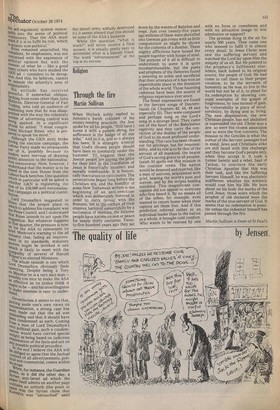Advertising
GKN: more trouble
Philip Kleinman
Pity poor Lord Drumalbyn. When last mentioned in this column, the chairman of the Advertising Standards Authority was being handed a political hot potato. As might have been expected, he made haste to drop it. But efforts are currently under way to heat it up again and hand it back to him.
The issue, as readers MaY remember, was that of GKN's anti-nationalisation advertisement and the complaint made to the ASA by Michael Rines, editor of Marketing, that the ad used research data in a scandalously misleading fashion. Rines was promised a reply but this, when it came, was simplY to the effect that the ASA considered the GKN ad to be political in character and hence outside its scope. Lord Drumalbyn recalled that ASA policy was laid down five . years ago as follows: "Political advertising in the press is a m-atter for individual editors and not for the voluntary system to control. The distinctive feature of political advertising is that its aim is t° influence opinion with a view to political action; whereas most other advertising is concerned wit,11 goods, services or entertainment.' The ASA conceded to Rines that "no doubt the advertiser himself published the advertisement to defend his own interests and for that reason may not regard the advertisement as political." But as far as the ASA is concerned the an was most certainly political. wrote Lord Drumalbyn: "To invite the ASA to express an opinion on whether the use in an advertisement of a response to a political question in a questionnaire or in an opinion poll accords with the Code [of Advertising Practice] is to draw Spectator kVeCtatOr October 26 1974 the self-regulatory system inescaPably into the arena of political crintroversy. That the ASA must resist if it is to fulfil its role, which is entirely non-political," kines remained unsatisfied. His complaint, he emphasises, was not concerned with the expression of Political opinion but with the elernent of what he — like a good raarlY others who have studied the GKNad — considers to be decepLitin• And this he believes, cannot outside the athority's area of tesPonsibility.
His attitude has received r.,?Werful, if somewhat oblique,
cking from none other than John _rmethven, Director-General of Fair _trading, who told an audience of illarketing men that he was disapPointed with the way the voluntary s,teni of advertising control was n-being applied. In a significant
,',rase he added: "I must congra'ate Michael Rines, who is prePared to speak his mind."
Although the GKN story broke ,t1ng the election campaign, the 31our Party made no propaganda se of it, possibly because its leaders were nervous of drawing public attention to the nationalisation controversy. Now, however, I understand that the matter is to be raised in the new House from the Labour back benches. One question vvhich in particular will be asked is whether GKN is registering the cticat of its E50,000 anti-nationalisa L" campaign as a political contrition. jo.Lord Drumalbyn suggested to u,'‘11,11,es that the proper place to “ch to address his complaint was "le Press Council, and I understand that Rines intends to act upon the tiggestion. But whatever happens tlat quarter, the pressure is now 1°311: for the ASA to reinterpret its • rter• Methven's warning to the ad Industry that, failing an improveMeat in its standards, statutory PoWers might be invoked is one Whicn is likely to meet with the
Pathy of several of Harold
Lo he whole episode is one which Drumalbyn obviously finds e"Psetting. Despite being a Tory 3t-Minister he is a very nice man — POssibly too nice to make the ASA 048 effective as its critics think it ti"t to be — and his unwillingness Make enemies is easy to under 1„1\1, evertheiess it seems to me that, ri-,tirig aside one's own views on b:0nalisation, a strong case has ,e1,1 made out that the ad was _
„ og and that it should have
e" condemned as such. Coming can u, man of Lord Drumalbyn's cina-trii° Political past, such a condemwoi,n would have carried special e, it as being based on judicious nlination of the facts and not on 'Possible political prejudice. be rsnhthe end I believe the ASA will co:uliged to agree that the factual tic4ent of all advertisements, poli • and commercial, comes within its scope. ur,W•„,hen, for instance, the Guardian as it did the other day, a ,p-tattan anti-Israel ad which the coPer itself admits on another page issi;Lains an untruth (the point at kit'''. was the Syrian claim that neitra was "untouched" until
the Israeli army wilfully destroyed it), it seems absurd that this should be none of the ASA's business. While the question "what is truth?" will never receive a final answer, it is usually pretty easy to determine what is a blatant fraud. The word "advertisement" at the top is no excuse.











































 Previous page
Previous page